Refrigeration System Suppliers In Surat
Details of Refrigeration System
Backed by our rich expertise in this domain, we present a comprehensive overview of Industrial Refrigeration Systems. These systems are manufactured to provide efficient cooling for large-scale industrial processes and storage, ensuring product quality and safety.
What is an Industrial Refrigeration System?
An industrial refrigeration system is a large-scale cooling setup used to lower and maintain temperatures in industrial environments. It removes heat from a process, storage area, or product to preserve quality, increase shelf life, or enable manufacturing processes. These systems are essential in industries such as food processing, chemical manufacturing, pharmaceuticals, and cold storage warehouses.
Key Components of Industrial Refrigeration Systems
The main components include compressors, condensers, evaporators, expansion valves, and refrigerants. Compressors compress the refrigerant gas, raising its pressure and temperature. Condensers then cool the refrigerant to change it into a liquid. Expansion valves reduce pressure, allowing the refrigerant to absorb heat in the evaporator and provide cooling.
Types of Industrial Refrigeration Systems
There are several types, including vapor compression systems, absorption systems, and cascade systems. Vapor compression is the most common, relying on mechanical compressors. Absorption systems use heat energy instead of mechanical work, suitable where waste heat is available. Cascade systems combine two refrigeration cycles to achieve very low temperatures.
Refrigerants Used in Industrial Systems
Common refrigerants include ammonia, R22, R404A, and newer eco-friendly options with low ozone depletion potential. Ammonia is popular in large plants due to its high efficiency and low cost, but requires careful handling because of its toxicity. New refrigerants focus on minimizing environmental impact while maintaining performance.
Applications of Industrial Refrigeration
Industrial refrigeration systems are widely used in food and beverage processing to preserve freshness and prevent microbial growth. They also support chemical and pharmaceutical industries by maintaining controlled environments required for sensitive processes. Additionally, cold storage warehouses depend heavily on these systems to store perishable goods safely.
Energy Efficiency in Industrial Refrigeration
Modern systems focus on energy efficiency through technologies like variable speed drives, improved heat exchangers, and optimized system design. Efficient insulation materials and precise temperature controls further reduce energy consumption, lowering operational costs and environmental footprint.
Safety and Monitoring Features
Industrial refrigeration plants incorporate safety devices such as pressure relief valves, gas detectors, and emergency shutdown systems. Continuous monitoring through sensors and automated controls helps detect leaks, temperature deviations, or equipment faults early, ensuring safe and reliable operation.
Maintenance and Service
Regular maintenance includes cleaning condenser coils, checking refrigerant levels, inspecting compressors, and testing control systems. Preventive maintenance prevents unexpected breakdowns and extends equipment lifespan. Skilled technicians perform routine checks and repairs to keep the system running efficiently.
Challenges in Industrial Refrigeration
Challenges include managing refrigerant leaks, ensuring worker safety around hazardous materials, and balancing energy efficiency with cooling needs. Compliance with environmental regulations and adapting to new refrigerants also require careful planning and investment.
Future Trends in Industrial Refrigeration
Emerging trends focus on sustainable refrigerants, smart control systems using IoT, and energy recovery technologies. These innovations aim to improve performance, reduce costs, and minimize environmental impact, helping industries meet stricter regulations and sustainability goals.
These Systems Are Used in Diverse Industrial Applications
Industrial refrigeration systems are crucial in commercial and industrial applications, including cold storage, food processing, pharmaceuticals, petrochemical plants, and ice manufacturing. Their ability to maintain precise temperature control ensures product integrity, safety, and process efficiency.
Offered Product
Refrigeration System
Step Into The Future Of Cooling Technology With Our Cutting-edge Refrigeration Systems, Proudly Crafted In Ahmedabad. We’ve Designed Our Systems To Cater To A Wide Range Of Industries, From Food And Beverage To Pharmaceuticals And More. Each Unit Is Meticulously Engineered Using Top-notch Materials And Innovative Technology, Ensuring Peak Performance And Energy Efficiency. With Features Like Adjustable Temperature Controls, Sturdy Insulation, And Easy-to-use Interfaces, Our Refrigeration S... Read moreRefrigeration System Manufacturer In Jamnagar
Key Components Of A Refrigeration SystemA Refrigeration System Is Essential In Various Industrial And Commercial Settings For Maintaining Controlled Temperatures. The Main Components Include Compressors, Condensers, Evaporators, And Expansion Valves. These Work Together To Remove Heat From The Desired Space And Maintain A Cool Temperature Efficiently.How Refrigeration Systems WorkThe Process Begins With The Compressor, Which Compresses The Refrigerant Gas To Increase Its Pressure And Tempe Continue
Refrigeration System Manufacturer In Uttar Pradesh
Critical Cooling Engine For Process & Storage FacilitiesLeveraging On Our Vast Industrial Experience, We Are A Supplier Of A Large Assortment Of Products Manufactured To Maintain Precise Temperature Control In Production Lines, Storage Facilities, And Food Processing Units. A Refrigeration System Plays A Central Role In Preserving Perishable Items, Stabilizing Process Heat, And Ensuring Regulatory Compliance.1. Core Thermal Management Functions1 Regulates Internal Temperatures For Sens Continue
Refrigeration System Manufacturer In Gorakhpur
Advanced Cooling Solutions For Temperature-Sensitive EnvironmentsWe Are A Firm Specializing In Manufacturing And Exporting Highly Efficient Refrigeration Systems Built For Consistent Temperature Control Across Commercial And Industrial Operations. These Systems Are Engineered Using Energy-efficient Components And Are Widely Used In Sectors Such As Food Processing, Pharmaceuticals, Cold Storage, And Dairy Industries.Each Unit Is Manufactured With Precision, Designed To Operate Efficiently In Continue




